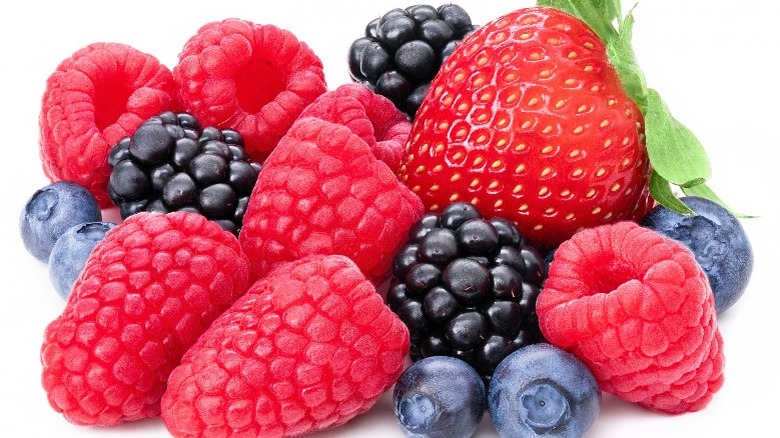What Are The Benefits Of A Low-Potassium Diet?
You might associate potassium with bananas, but you are likely eating a number of other foods that contain potassium. Some foods have higher levels of potassium than others. This can create issues for certain people if they regularly consume too many of these foods.
Known by its trademark "K" on the periodic table, potassium was first isolated in 1807 by Sir Humphry Davy, an English chemist. Potassium is a vital chemical element for both plant and animal life. It supports photosynthesis, regulates absorption and growth, and transmits electrochemical impulses via nerves and muscles. Potassium also supports the body's intake of nutrients and rids cells of waste.
A proper balance of potassium is essential. If you have too much or too little potassium, this could lead to serious health consequences. However, potassium in the soil ensures that we can get this vital element from food sources, per Britannica.
Many foods besides bananas are rich sources of potassium, including apricots, raisins, potatoes, squash, spinach, broccoli, oranges, and other fruits and vegetables. You also get an intake of potassium when you consume salmon and chicken, according to the experts at Harvard T.H. Chan.
Data shows that Americans consume less potassium than they should. Consequently, it has been identified as a "nutrient of public health concern," according to the National Institutes of Health. Potassium deficiency, also called hypokalemia, can lead to serious health issues such as high blood pressure and kidney stone risk. Conversely, getting too much potassium can also lead to severe consequences.
A low-potassium diet can benefit people with certain conditions
Even though most Americans are not getting enough potassium in their diet, there are people who are at risk of having too much potassium. A normal potassium level is considered between 3.5 and 5 millimoles per liter (mmol/L). However, when someone has 5.5 mmol/L in their blood, they have what is known as high potassium or hyperkalemia. A reading of 6.5 or above can be dangerous and lead to serious heart problems, according to the experts at Cleveland Clinic.
Hyperkalemia is due to your body having more potassium than your kidneys are able to filter out through your urine, causing excess potassium to build up in the blood. To confirm if you have hyperkalemia, your doctor administers a blood test known as a serum potassium test.
For people who have chronic conditions such as type 1 diabetes, heart conditions, liver disease, kidney disease, and adrenal gland issues, going on a low-potassium diet may help lower the risk of the kidneys becoming overburdened. For people at risk, healthcare professionals can suggest dietary adjustments that limit daily potassium intake to 2,000 milligrams to make sure potassium levels stay within a healthy window, per Medical News Today.
Being on a low-potassium diet to help reduce the negative effects of high-potassium levels doesn't mean you have to make sacrifices. There are a host of low-potassium fruits, vegetables, proteins, and carbohydrates that you can consume and likely already enjoy.


